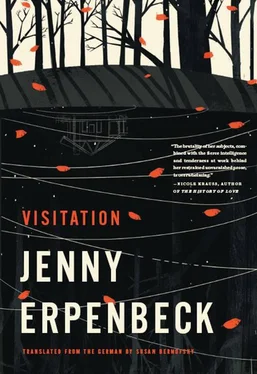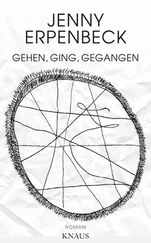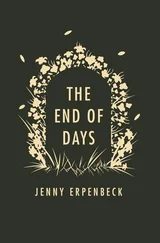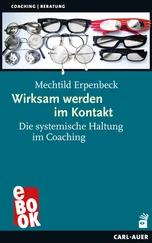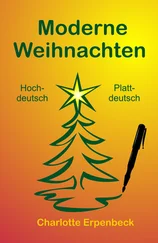In the morning, when the others are already busy driving the horses out of the garden onto the sandy road, he takes half a loaf of bread and goes back up to the bedroom one last time. There he plucks the marten pelt from the railing of the balcony, throws it over his shoulder, then goes over to the closet, grabs hold of one of the fake columns and yanks open the door. Without looking inside, he throws the heel of the bread back into the darkness, then closes the door and leaves the room. With the pelt dangling over his shoulder, an uncured skin, and the roll of leather in his coat pocket, he looks like a hunter. At home, in his village, there was one like that, he had gotten so used to living in the woods that he returned to human society only to sell or trade his kill for weapons and ammunition. He felt more at home among the animals who sooner or later became his quarry than among human beings. Sometimes he stayed away from the village for a long time, and then he’d start coming again, so that you couldn’t tell whether or not he’d died yet. Now it seemed the village no longer existed, but perhaps the hunter was still roaming through the woods. Or else he’d long since lain down among the animals and died there, finally his own quarry.
AFTER THE RUSSIANS have pulled out, the gardener prunes the shrubs and bushes in the hope that they might bud a second time. He turns the soil of the big and small meadows and sets out potatoes forty centimeters apart. The potato plants require a lot of water. The gardener fetches the oars and oarlocks from the workshop for the mistress of the house and assists her in retrieving the crates sunk on the shoal of the Nackliger and bringing them back to the house. He extracts the honey. In the evening he sits on the threshold of the apiary and smokes a cigar, at nightfall he lies down to sleep on his cot beside the drum of the extractor. When the potatoes have reached a height of fifteen to twenty centimeters, he hills the plants. He gives the dock a coat of pine tar and replaces the rotten boards. He prunes the willow tree beside the shore whose twigs have grown down so low over the edge of the dock that they get in your way when you step out onto it. He places new frames in the beehives. He pulls out the weeds growing between the roses and in the flowerbed in front of the house. He waters the shrubs, potatoes and flowers twice a day, once early in the morning and once at dusk. When the foliage of the potato plants begins to wither, it is time for the harvest, and he stores the potatoes in the cool, dark cellar. In fall he rakes up the leaves, burns them, covers the rose-bed and the flowerbed before the house with spruce twigs to protect the plants from the frost, when fall is coming to an end he empties all the water pipes in the house and turns off the main spigot, he closes all the shutters including those of the bathing house down by the water. He retrieves the electric heating coil from the cellar and sets it up near his bed in the extractor room. In winter he prunes the apple and pear trees. He heats the house in advance when the architect and his wife are planning a visit and turns the water back on for the length of their stay.
In spring he helps the householder erect a fence in front of the house to enclose the flowerbed with its cypress tree, the entrance to the garage and above all the big gate, to protect the house from unwanted visitors. The gardener prunes the shrubs, replants grass on the two potato fields, helps empty the cesspit, he pulls out weeds, waters the bare dirt of the big and small meadows until the grass begins to sprout, he harvests cherries, harvests apples and pears, stores them in the cellar of the house, rakes the leaves, burns them, saws off dry branches, splits the wood, retrieves the heating coil from the cellar and sets it up near his bed in the extractor room, during the winter he sets traps in the attic for the martens. He heats the house in advance when the architect and his wife are planning a visit. In spring, he prunes the apple and pear trees, he uncovers the beds, prunes the shrubs, pulls up weeds, swaps out the frames in the beehives; in summer, he runs the sprinkler twice a day and prunes the cherry trees. In fall he chops wood and smokes out the moles, at the beginning of winter he empties all the water pipes in the house.
When several years later the blue spruce is blown over just before New Year’s, it barely misses the thatched roof of the house. It falls right across the path that leads between the small and big meadows down to the water, and is heavy enough to crush several rosebushes in the bed beside the terrace. The gardener saws up the trunk, splits the pieces and stacks the logs down in the woodshed. In spring when he is digging up the rose-bed to replace the dead plants with new ones, he discovers a chest filled with silver. Since the house is sealed, he takes the chest for safekeeping and places it, just as it is, on a shelf in the extractor room next to the jars of honey.
The following year, the municipality issues the gardener a permit to continue to make his residence in the extractor room and entrusts him with the keys to workshop and woodshed. For a spring, a summer, a fall and a winter the gardener continues to tend the now ownerless garden just as before: He fertilizes, waters, prunes, swaps out the frames in the beehives, extracts the honey, wraps the trunks of the fruit trees with cloth to keep the deer that leap over the fence from chewing the bark; the gardener weeds, harvests, rakes, burns, saws, splits, smokes out and covers beds with spruce twigs. What he needs to live he acquires from the farmers by bartering fruit, firewood and honey. A year and a quarter later, new householders arrive, having leased the property from the municipality: A writer couple from Berlin. The gardener shows them the garden, the workshop, the woodshed, the dock and the bathing house, as well as the apiary for twelve colonies and the extractor room and gives them the keys.
The new householder seeks out the gardener to discuss several changes with respect to the garden. A staghorn sumac is to be placed at the center of the small meadow, and at the center of the large one a maple. The gardener digs the holes for the plants. After working his way through the thin layer of humus, he first strikes bedrock that has to be broken up with his spade, and only beneath this is the layer of sand with the groundwater coursing through it, and finally beneath the sand the blue clay found everywhere in this region. The gardener excavates the holes up to a depth of eighty centimeters and fills the bottom with composted soil so the staghorn sumac and the maple will flourish.
After consultation with the householder, the gardener fills the hollow in the trunk of the walnut tree with concrete to give the tree greater stability. He fertilizes the flowers, the shrubs and the freshly planted trees, mows the grass of the two meadows, swaps out the frames in the beehives, extracts the honey, he harvests cherries, twice a day in summer he waters the rose-bed and the flowerbed next to the house and the shrubs; meanwhile he turns on the sprinkler on the small and big meadows for half an hour daily as well as beneath the fruit trees so that everything will be well irrigated, he prunes the cherries, harvests apples and pears. On instructions from the mistress of the house, he delivers two thirds of both the honey and the harvested fruit to the local FVP, the government trade organization “Fruit, Vegetables and Potatoes.”
Together with the new householder, he paves the area in front of the workshop with flagstones to have a better work surface for painting and repairs. In winter, the rowboat along with the iron trestles and the wooden planks for the dock are to be stored there. At the householder’s request, the gardener tears down the wooden boat shelter beside the dock — its posts were rotting. The gardener makes urgently needed repairs on the thatch roofs of both the main house and bathing house. In fall he saws up the branches felled by storms from the big oak tree and several of the pines, splits the pieces and stacks the logs in the woodshed, when fall is coming to an end he retrieves the heating coil from the cellar of the house and sets it up beside his bed in the extractor room, and finally at the beginning of winter he empties all the water pipes in the house and turns off the main valve.
Читать дальше
